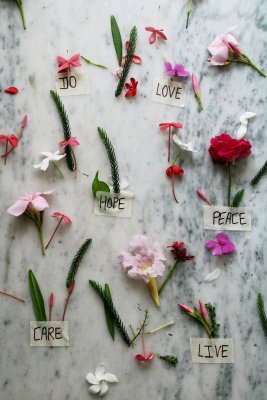Peace and Joy – How to Actually Get These Feelings in Your Life

photo by Anna Tarazevich at Pexels
by Andrea M. Darcy
We wish each other peace and joy each holiday season.
But how can we actually bring these feelings into our life and make them more than just words scrawled in a greeting card? And are they even realistic states of being?
Are peace and joy overrated?
Peace, for far too many people, means avoiding all and any conflict. Or saying no to social events, or life challenges that might in any way leave us feeling bad about ourselves, affecting our fragile sense of self.
In truth, we aren’t actually at peace at all. We are simply in hiding and playing small.
Peace doesn’t come from avoiding things. It comes from being so comfortable and confident with who we are that we don’t have to hide from conflict, as we can turn it into something calm and constructive. We don’t have to hide from life challenges and social interactions because failures and the opinions of others don’t dictate who we are.
Fake joy or real joy?
As for joy, it, too, has false cousins. If we pretend we are happy all the time as a way to repress old sadness and anger? Or to be liked? Or because we are convinced ‘acting positive’ will somehow magic away inner turmoil? It’s not really joy.
There are also false notions about joy that are certainly popular, making the self-help industry millions, while making millions miserable and convinced they are a failure. Simply as they aren’t ‘happy all the time’.
 When no healthy person feels happy all the time. For example, we need to feel sadness to even know what joy is. And anger helps us set boundaries.
When no healthy person feels happy all the time. For example, we need to feel sadness to even know what joy is. And anger helps us set boundaries.
An interesting research study by a professor at Yale found that aiming to only be happy all the time can have many negative consequences. It is connected to being less successful, more selfish, and also gullible. And it can lead to being overconfident and taking risks, such as excess alcohol and drug consumption and binge eating.
5 Steps to actually be more zen
But how do we go from fake inner zen to real? And truly build peace and joy into our lives for good?
1. Replace your anti-zen habits.
You know what they are. The things that leave you running on a stress high, like:
As for what to replace them with? Two words — boundaries, and acceptance.
Boundaries mean you say no when you are doing things only to please and create space in your life. Space to take care of yourself and develop your sense of self.
Acceptance means you stop getting trapped in grass is greener syndrome. You take a hard look at your unrealistic and exhausting high expectations for life, yourself, and others, and lower them as much as possible. It’s not about laziness, it’s about letting yourself feel good.
2. Change your patterns of attention.
The funny thing about peace and joy is that they are often right in front of us, but we miss them entirely.
We are so busy focussing on what is not working in our lives, what is stressing us out, we walk right past a beautiful park every day on our way to go back to the office and eat at our desk. Constantly put off that dance class we meant to take.
Two techniques are really powerful here. One is good old gratitude. It’s made the rounds for years because it works. If you find it hard to remember to write down what you are grateful for in a journal, try attaching gratitude to something you always do, like always finding five things to be grateful for as you brush your teeth before bed.
Data analysis using 60 research studies around gratitude found that it consistently lowered depression, regardless of the age group involved.
Then there is mindfulness. It requires commitment, yes. But over time a mindfulness practice entirely realigns our perspective away from worries about the past and future, and directly to the now moment instead.
3. Retrain your thinking.
If there is one thing that robs us most of peace and joy it’s not what happens to us. It’s what we think about what happens to us.
Cognitive behavioural therapy (CBT) is based on the concept that negative thinking sets of a cycle that leads directly to low moods. A negative thought creates a negative emotion, which then creates a negative body sensation. That discomfort leads us to take a negative choice. And this negative action then starts another negative thought… and on the circle goes, until we feel depressed.
The magic word here is balanced thinking. It means that we learn to not think the very worse or go into victim mode. We also don’t use positivity to bypass reality, which isn’t helpful either. Instead, we find the middle ground.
If we get caught in a traffic jam on a way to an important pitch meeting, we don’t immediately assume, “Well I’ll be so late I won’t get the contract now. Right, might as well just turn around and go home.” Or brush off what’s happening with fake positive thinking so that we don’t even call and let the others know we are late. Instead we calmly assess things then decide, “Well, it’s not ideal, but I’ll give them a call to let them know I’m late, and use this time stuck in traffic to practice saying my pitch out loud, which could actually help me.”
[Learn more in our article, “How to Practice Balanced Thinking“].
4. Rehaul your relating skills.
 Another common destroyer of peace and joy is relationship issues. Constant conflict or issues with relating leave us feeling so lonely and disconnected it can even affect our physical health long term.
Another common destroyer of peace and joy is relationship issues. Constant conflict or issues with relating leave us feeling so lonely and disconnected it can even affect our physical health long term.
The crazy thing about relating is that many of us think we are just doomed to always have bad relationships, or be alone. But in fact relating is simply a skill. Anyone can learn it, and, with enough practise, revolutionise their relationships.
This includes:
- learning how to properly listen
- asking useful questions
- navigating conflict better
- knowing how to offer constructive over destructive criticism
- managing your emotions if you tend to overreact and lash out.
Another part of relating is accepting that we are not so different than everyone else. A wonderful habit to get into on this front is volunteering, which has been shown by research to help with depression and increase life satisfaction.
5. Get support.
Sometimes we’ve just lived through too much and we’re a bit broken inside. Childhood trauma, for example, can leave us with so little sense of self and esteem, that deep down we don’t even think we deserve good things. Or we are convinced the world is so dangerous, peace and joy just can’t happen. Or we just feel angry. All the time.
It can feel like a death sentence, an endless life of misery. But it doesn’t have to be. Trauma affects our ways of thinking and being, but there are nowadays many therapies that are designed to help trauma. They can help you retrain your brain’s trauma response, and also to escape the repetitive cycles of difficulties you experience.
Time to stop being on team misery and relearn what joy feels like? We connect you to a team of some of London’s best rated therapists and top CBT counsellors. Or use our booking site to find UK-wide registered therapists for every budget, including online counselling from the comfort of your home.
 Andrea M. Darcy has been a mental health writer for over ten years, she has studied person centred counselling and coaching. Follow her on Instagram for useful life tips @am_darcy
Andrea M. Darcy has been a mental health writer for over ten years, she has studied person centred counselling and coaching. Follow her on Instagram for useful life tips @am_darcy




